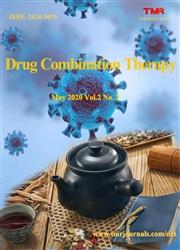Successful re-challenge of PD-1 inhibitors in combination with bevacizumab and pemetrexed for multiple primary NSCLC progressing on prior PD-1 inhibitor therapy: one case report
引用次数: 0
Abstract
Lung cancer is a malignant tumor with high incidence and mortality rates in China and worldwide. Approximately 10% of these diseases are caused by multiple primary non-small cell lung cancers (NSCLC). Traditional antitumor therapies, such as chemotherapy, radiotherapy, and targeted therapy, have limited efficacy in the treatment of advanced synchronous multiple primary NSCLC. Immunotherapy is considered the standard of care for advanced or recurrent NSCLC, however, approximately 60% of patients develop primary or secondary resistance to treatment. There are no standard recommendations for overcoming immune resistance. We describe a case of simultaneous multiple primary NSCLC in a patient who received programmed death factor-1 (PD-1) inhibitor monotherapy and developed brain metastases. After receiving second-line treatment with a combination of another PD-1 inhibitor, pemetrexed, and bevacizumab, the patient achieved complete remission, although they experienced grade 3 immune-related adverse reactions. Immune re-challenge is safe and feasible, and choosing a synergistic combination regimen is one of the options to overcome immune resistance. A larger sample size is needed to confirm the effectiveness and safety of this strategy in patients with NSCLC resistant to prior PD-1 inhibitors.PD-1抑制剂联合贝伐珠单抗和培美曲塞成功治疗先前PD-1抑制剂治疗进展的多发性原发性NSCLC: 1例报告
肺癌是中国乃至世界范围内发病率和死亡率较高的恶性肿瘤。这些疾病中约有10%是由多发性原发性非小细胞肺癌(NSCLC)引起的。传统的抗肿瘤治疗方法,如化疗、放疗和靶向治疗,对晚期同步多发原发性NSCLC的治疗效果有限。免疫治疗被认为是晚期或复发性非小细胞肺癌的标准治疗,然而,大约60%的患者对治疗产生原发性或继发性耐药性。对于克服免疫抵抗没有标准的建议。我们描述了一例同时多发性原发性非小细胞肺癌患者,接受程序性死亡因子-1 (PD-1)抑制剂单药治疗并发生脑转移。在接受另一种PD-1抑制剂培美曲塞和贝伐单抗联合的二线治疗后,患者获得了完全缓解,尽管他们经历了3级免疫相关不良反应。免疫再攻击是安全可行的,选择协同联合方案是克服免疫耐药的选择之一。需要更大的样本量来确认该策略在对既往PD-1抑制剂耐药的非小细胞肺癌患者中的有效性和安全性。
本文章由计算机程序翻译,如有差异,请以英文原文为准。
求助全文
约1分钟内获得全文
求助全文

 求助内容:
求助内容: 应助结果提醒方式:
应助结果提醒方式:


